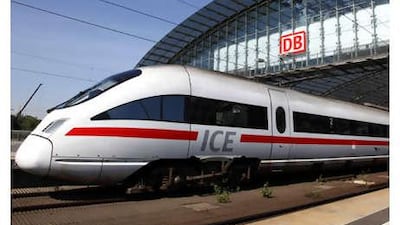Major rail projects in Abu Dhabi and the wider GCC region are beginning to take shape after a lull of more than six months in project announcements. This year is shaping up as an important one for Abu Dhabi's plans to build a tram and metro network, with the Government soon to announce the winners of feasibility studies, industry executives say.
It will also be crucial for a 1,500km federal freight and passenger rail project overseen by Union Railway, which should refashion the country's transport networks and eliminate the need for the thousands of lorries that currently carry goods and clog the country's roads. The global downturn and the economic impact on the UAE, including a major debt restructuring deal for Dubai that included billions of dollars in support from Abu Dhabi, are thought to be among the causes of a longer review phase than was expected.
But consultants, engineers and government officials all stressed their confidence that transport projects, which include more than Dh300 billion (US$81.67bn) for Abu Dhabi's 2030 Plan alone, would proceed. "Projects that we were expecting to go ahead in Abu Dhabi are moving a bit slower than expected but they are definitely on the right track and going ahead," said Nader Reslan, the Middle East sales director for transport and local infrastructure at Bentley Systems, which produces software for rail systems.
Front-runners for a reported 18-month feasibility study to evaluate Abu Dhabi's plans for a 340km tram network in the UAE capital include the Spanish companies Sener and Typsa Group, while the leading consortium for a 26-week study to examine the feasibility of a metro system is the Abu Dhabi Advanced Public Transit group, made up of Parsons Brinckherhoff, Deutsche Bahn International and AECOM. Initial plans for the metro lines include 130km of mostly underground routes on Abu Dhabi island and surrounding areas. It is uncertain whether the Abu Dhabi Department of Transport (DOT) still plans to introduce the tram by 2014 and the metro by 2016.
Jamshid Soheili, the Middle East director of transport and infrastructure planning at the consultancy Scott Wilson, said feasibility studies would help the Government understand the need, timing and scale of the two mass-transit systems. "The findings may suggest doubling the offering or halving it, or in the most extreme form, saying 'you don't need it,' or 'you need plenty of it'," Mr Soheili said.
The metro award was expected in the third quarter of last year. In March, the DOT chairman, Abdullah al Otaiba, said the emirate's Dh300bn in transport projects could be delayed depending on the results of a population growth study undertaken by the Abu Dhabi Urban Planning Council (UPC). The UPC's study came out a month later and predicted that the Abu Dhabi population would grow to 1,189,000 million people in 2013, or 111,000 fewer than previously forecast.
UPC planners said the revised forecast for demand did not change the long-term requirements for mass transit in Abu Dhabi. "Mass transit is appropriate in Abu Dhabi because the way that we are planning future development concentrates people around future transit stations … the existing density in the downtown is very transit supportive," said Bill Lashbrook, the transport planning manager at the UPC.
Union Railways has said it would begin accepting bids from rail companies from next month to build the initial sections of the UAE-wide network, which will link Ruwais and Hapshan in the Al Gharbia region and transport granulated sulphur. This month, a US trade delegation is expected to visit Abu Dhabi. Union's network will one day be the UAE's contribution to a Gulf-wide rail project beginning in Kuwait and terminating at Muscat, or even further south in Yemen, pending discussions. The next GCC ministerial meeting is scheduled for June 15 and the rail project is expected to be high on the agenda.
The rail line was originally expected to open in 2017 but has since been put back due to "various operating parameters", including specific routings, schedules and funding, a planner on the project said. igale@thenational.ae

